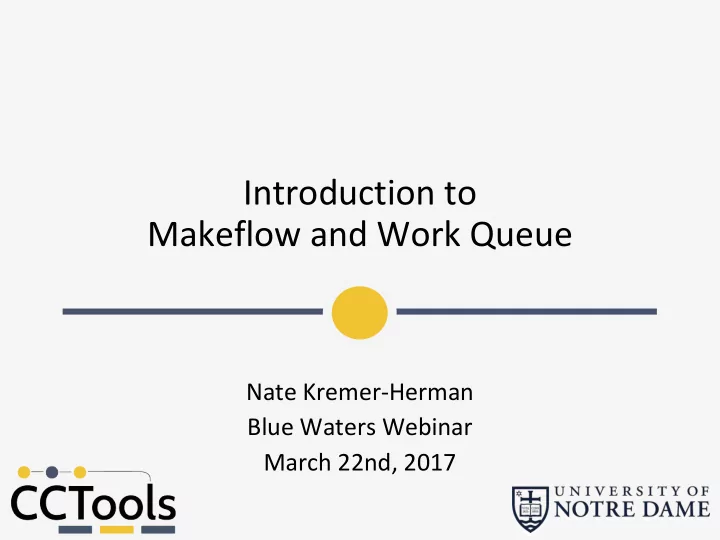

Introduction to Makeflow and Work Queue Nate Kremer-Herman Blue Waters Webinar March 22nd, 2017
The Cooperative Computing Lab • We collaborate with people who have large scale computing problems in science, engineering, and other fields. • We operate computer systems on the O(10,000) cores: clusters, clouds, grids. • We conduct computer science research in the context of real people and problems. • We develop open source software for large scale distributed computing.
Our Philosophy: • Harness all the resources that are available: desktops, clusters, clouds, and grids. • Make it easy to scale up from one desktop to national scale infrastructure. • Provide familiar interfaces that make it easy to connect existing apps together. • Allow portability across operating systems, storage systems, middleware … • Make simple things easy, and complex things possible. • No special privileges required.
A Quick Tour of the CCTools • Open source, GNU General Public License. • Compiles in 1-2 minutes, installs in $HOME. • Runs on Linux, Solaris, MacOS, FreeBSD, … • Interoperates with many distributed computing systems. ● Condor, SGE, SLURM, TORQUE, Globus, iRODS, Hadoop … • Components: ● Makeflow – A portable workflow manager. ● Work Queue – A lightweight distributed execution system. ● All-Pairs / Wavefront / SAND – Specialized execution engines. ● Parrot – A personal user-level virtual filesystem. ● Chirp – A user-level distributed filesystem.
Lots of Documentation
Recap from Last Workflow Webinar • What is a workflow? • A collection of things to do (tasks) to reach a final result. • What are the parts of a task? • The thing we want to do (application to run), input to give that application, output we expect to get from that application. • How can a workflow management system help me do my research? • Add automation, resource provisioning, task scheduling, data management, etc. bluewaters.ncsa.illinois.edu/webinars/workflows/overview-of-scientific-workflows
Makeflow: A Portable Workflow System
An Old Idea: Makefiles part1 part2 part3: input.data split.py ./split.py input.data out1: part1 mysim.exe ./mysim.exe part1 >out1 out2: part2 mysim.exe ./mysim.exe part2 >out2 out3: part3 mysim.exe ./mysim.exe part3 >out3 result: out1 out2 out3 join.py ./join.py out1 out2 out3 > result
Makeflow = Make + Workflow • Provides portability across batch systems. • Enable parallelism (but not too much!). • Trickle out work to batch system. • Fault tolerance at multiple scales. • Data and resource management. Makeflow Work Local SLURM TORQUE Queue
Makeflow Syntax [output files] : [input files] One rule [command to run] calib.dat sim.exe out.txt in.dat sim.exe in.dat –p 50 > out.txt out.txt : in.dat calib.dat sim.exe out.txt : in.dat Not quite right! sim.exe –p 50 in.data > out.txt sim.exe –p 50 in.data > out.txt
You must state all the files needed by the command.
example.makeflow out.10 : in.dat calib.dat sim.exe sim.exe –p 10 in.data > out.10 out.20 : in.dat calib.dat sim.exe sim.exe –p 20 in.data > out.20 out.30 : in.dat calib.dat sim.exe sim.exe –p 30 in.data > out.30
Sync Point - Questions? • Several additional features to Makeflow which we do not have time to cover today (please take a look at our documentation). • Categories and resource specification. • Shared filesystems support. • Container support (Docker and Singularity). ccl.cse.nd.edu/software/manuals/makeflow.html
Let’s work through a brief tutorial: ccl.cse.nd.edu/software/tutorials/ncsatut17/makeflow-tutorial.php
Makeflow + Work Queue
Makeflow + Batch System Makefile XSEDE Private Torque makeflow –T torque Cluster Cluster ??? Makeflow ??? makeflow –T condor Campus Public Condor Cloud Pool Provider Local Files and Programs
Makeflow + Work Queue torque_submit_workers W W Makefile XSEDE Private Torque W Cluster Cluster W submit W W Thousands of tasks Workers in a Makeflow Personal Cloud W W W Campus Public ssh Condor Cloud Pool Provider W W W W Local Files and Programs condor_submit_workers
Advantages of Work Queue • Harness multiple resources simultaneously. • Hold on to cluster nodes to execute multiple tasks rapidly. (ms/task instead of min/task) • Scale resources up and down as needed. • Better management of data, with local caching for data intensive tasks. • Matching of tasks to nodes with data.
Project Names makeflow … work_queue_worker –N myproject –N myproject connect to workflow.iu:9050 Makeflow Worker (port 9050) advertise query work_queue_status Catalog query “myproject” is at workflow.iu:9050
work_queue_status
Work Queue Visualization Dashboard ccl.cse.nd.edu/software/workqueue/status
Resilience and Fault Tolerance • MF +WQ is fault tolerant in many different ways: ● If Makeflow crashes (or is killed) at any point, it will recover by reading the transaction log and continue where it left off. ● Makeflow keeps statistics on both network and task performance, so that excessively bad workers are avoided. ● If a worker crashes, the master will detect the failure and restart the task elsewhere. ● Workers can be added and removed at any time during the execution of the workflow. ● Multiple masters with the same project name can be added and removed while the workers remain. ● If the worker sits idle for too long (default 15m) it will exit, so it does not hold resources while idle.
Let’s return to the tutorial: ccl.cse.nd.edu/software/tutorials/ncsatut17/makeflow-tutorial.php
Visit our website: ccl.cse.nd.edu Follow us on Twitter: @ProfThain Check out our blog: cclnd.blogspot.com Makeflow examples: github.com/cooperative-computing-lab /makeflow-examples
Recommend
More recommend